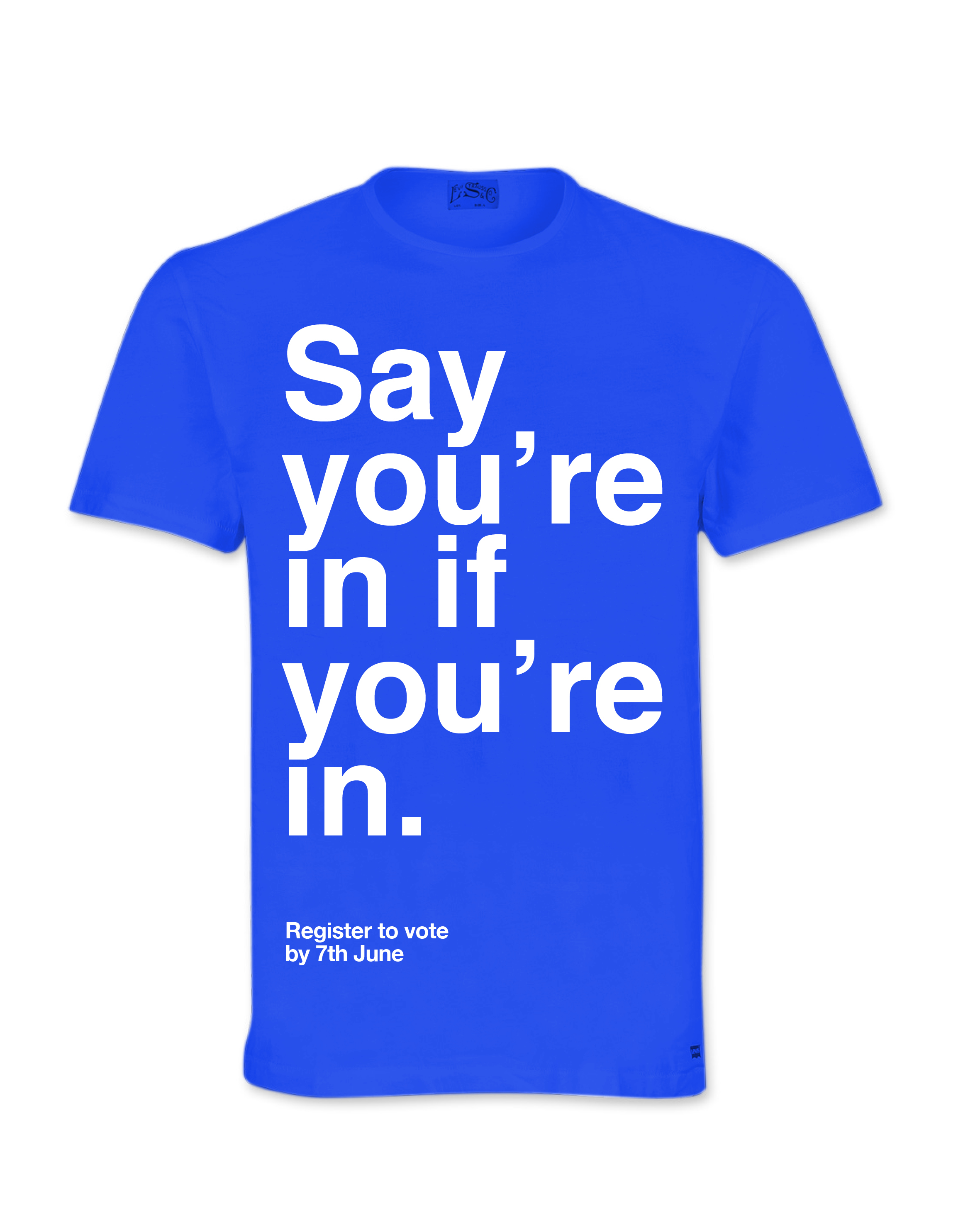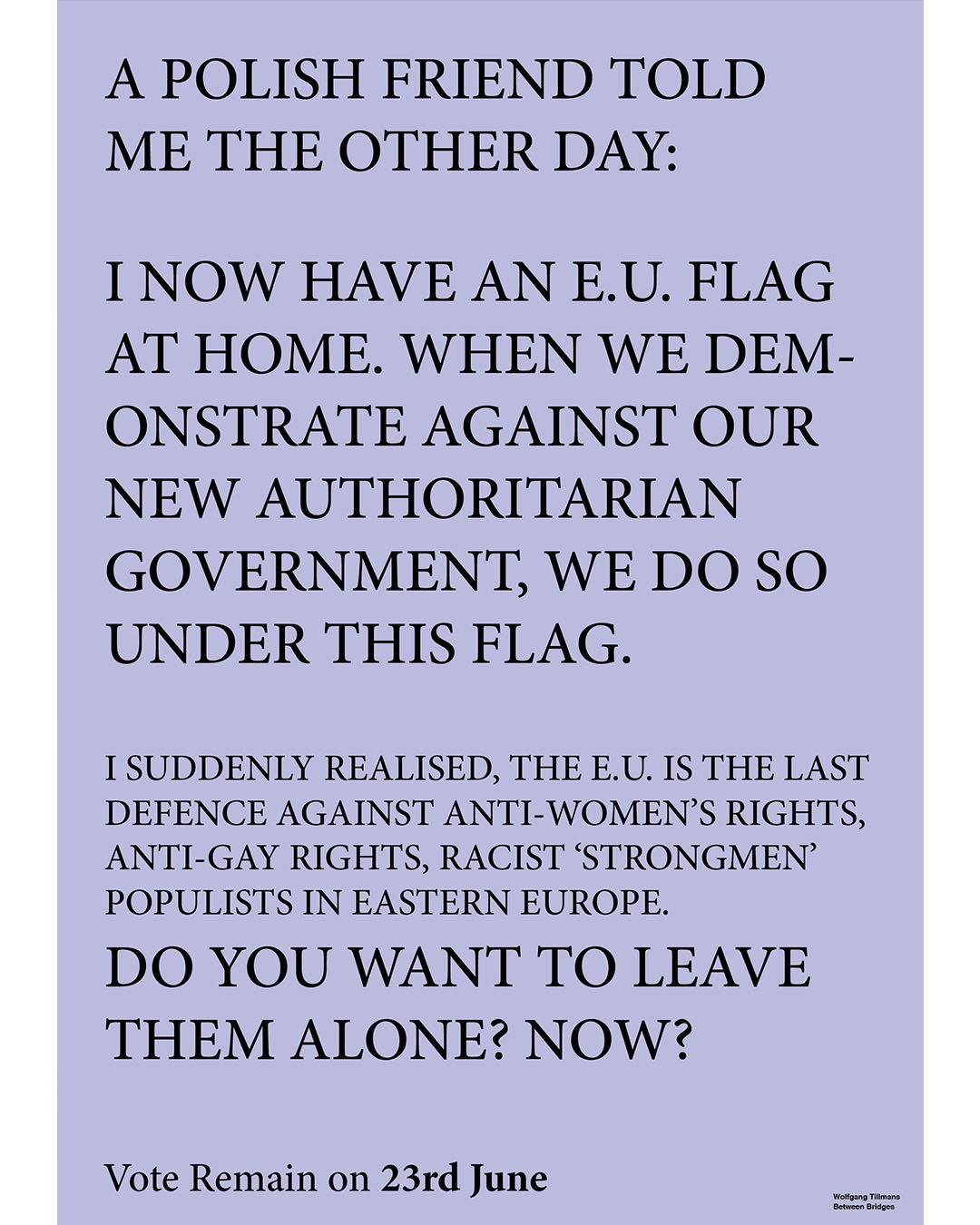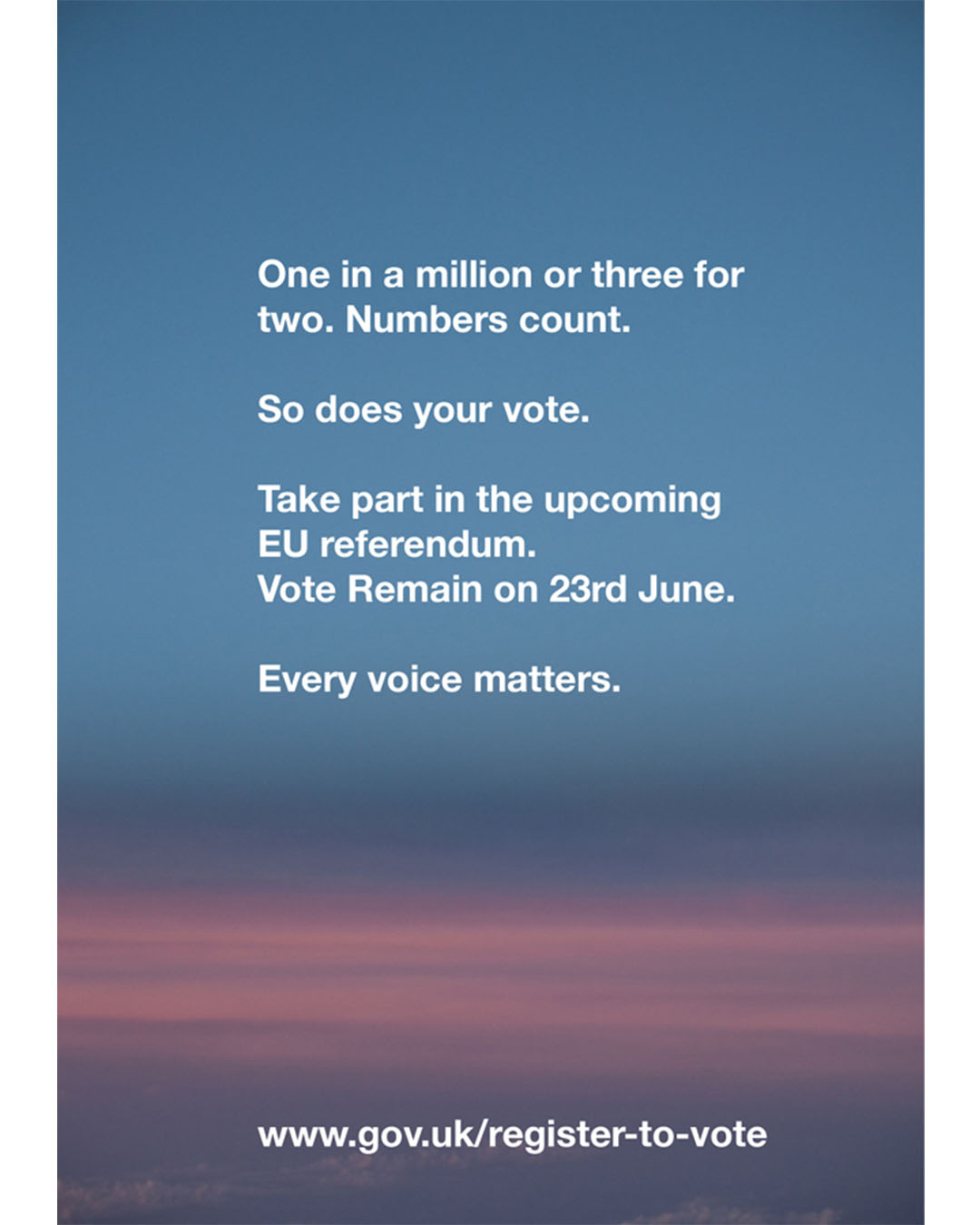pro-EU / anti-Brexit campaign
March–June 2016

Statement from 4 July 2016
(Please see below a recap of the pro-EU/anti-Brexit campaign in the form of a mail, which kept growing longer and longer as I was writing it, to Cornelia Parker, who sent me the attached photograph)
Dear Cornelia,
Thank you so much for the photo taken on referendum day in Chichester. It means a lot to me that our posters made it to outside London. It was an uphill struggle. Annett Kottek at my London studio literally wrote to fifty different student unions and just got three replies. One regional Labour Party office requested posters and said they would forward our email to relevant people but we never heard back.
Charities and faith groups, like the Quakers, liked them a lot but said, because of their charitable status, they were not allowed to express a political opinion. The same went for many of the arts organisations and colleges we wrote to. However a good number of them across the country didn’t seem to be troubled by this and displayed and distributed the posters vigorously. Respect to you! There were many individuals who adopted poster tubes and distributed them. Volunteers Chester Kottek and John Cronin made endless runs to the post office mailing tubes. Martinspeed, the art shippers, did a great job storing the twenty-one industrial size pallets of poster tubes, and delivering them to Sebastian Street one by one, all free of charge.
The self-print and social media parts of the campaign were the most visible, but I’m glad I insisted on having old fashioned A1 posters. Thanks to the financial help of Evelyn Stern, David Chipperfield and Ruth and Richard Rogers we printed 25,000 of them. Daniel Mason of Something Else Press handled the logistics of this printing job in London.
After having designed the first twenty-five online posters, released 23rd April, Paul Hutchinson and myself at the Berlin studio tirelessly kept texting and designing new and adapting existing posters, including specialised versions for different target groups. Also at the Berlin studio Armin Gerold Lorenz doubled up as website manager and together with Evelyn Marwehe as organisers of the numerous press requests. Freelance editor Graham Fallowes was available online to instantly copy-edit any new statements and poster texts.
In the run up to the 7th June registration deadline I realized the potential of T-shirts, which we then hastily produced thanks to Merch and Destroy. These then went to various famous people or people who know them, with mixed results – many did not respond, others did. Juergen Teller’s photo of Vivienne Westwood went viral, and so did the one of ‘James Bond’ on the last day of the campaign. David Cameron re-tweeted it two hours after I posted it on my Instagram account.
In the last ten days of the campaign a larger print run of T-shirts made in London were distributed around art galleries and book shops as well as through Lily Cole’s site impossible.com. i-D magazine and Dazed Digital held drop-in online shoots with the shirts and the Boiler Room DJ site got strongly behind the cause.
Always in the good hands of Eugen Ivan Bergmann at the Between Bridges space in Berlin, we held events around Brexit and related subjects, the refugee crisis and the rise of populism and right-wing extremism across Europe.
Needless to say almost all involved have a ‘migrant status’, are ‘immigrants’ of some sort: three British living in Germany, two Germans living in London, a German born to an Irish father, an Austrian in Berlin, a Kazakh-born German and so on.
Also a big thank you to all at the studio who were working on my other projects and who found time to contribute greatly, through feedback and advice and by keeping a good spirit in the midst of the madness.
To all who consider getting involved in activism, I can only encourage you to do so. It was a great and rewarding experience, despite not reaching our goal. It brings people from different backgrounds together in unexpected and friendly ways and creates friendships that hopefully will last. For myself I plan to take this further and to other places as right-wing populism and extremism will be with us for some time to come. Please get in touch if you would like to contribute in whatever way in the future. I was not the only artist generating messages and imagery: In the light of the dull official IN campaign it was great to see that artists can have a different and often more direct voice. Check out the eu-uk.info website.
My heartfelt thanks and respect to all supporters!
Below is the new Between Bridges programme which promises to be a strong series of events before the summer break. Please come by daytime, or on Thursday evenings and other dates advertised below.
Wolfgang
Please visit the archive section www.tillmans.co.uk/campaign-eu to see and download all parts of the campaign.
Statement from 24 June 2016 (Sueddeutsche Zeitung)
I’m not feeling depressed today. I had a profoundly sad moment the evening before last when, leaving Tate Modern, I looked at the building and after sunset walked over the Millennium Bridge. Both were opened in 2000, both symbols of a new openness. That same month I was nominated for the Turner Prize for British art alongside two other non-Britons and one Briton. This was the new London that had been taking shape since the early 90s. The London that had self-confidently taken its place at the very centre of Europe.
I looked at the yellow-red sky to the west and my eyes filled with tears, realising that this could be the final evening before a new era. That sixteen years later we should have got to a situation where half the population rejects this open and international spirit is hard to comprehend. This all happened when there was still the general feeling that the vote would favour remain. The fact that, unlike many others this morning, I’m not feeling deeply depressed about the way the English and Welsh voted, makes me realise that the sorrow I’d felt two days previously was the emotional manifestation of something that I had sensed for a long time; which Tony Blair put into words on 29 August last year in the Guardian. Blair who had completely lost touch with reality over Iraq, suddenly showed a moment of lucidity, as he wrote to fellow party members in an effort to persuade them not to elect the populist left-wing candidate, Jeremy Corbyn, as leader of the Labour Party. Reading the last paragraph, the hairs stood up on the back of my neck as Blair admitted that his generation would have to rethink everything, because what we are currently seeing is part of something even bigger: ‘But people like me have a lot of thinking to do. We don’t yet properly understand this. It is about to transform a political institution we spent our whole lives defending. But it is part of something much bigger in politics.
Because it is a vast wave of feeling against the unfairness of globalisation, against elites, against the humdrum navigation of decision-making in an imperfect world, it persuades itself that it has a monopoly on authenticity. They’re “telling it like it is”, when, of course, they’re telling it like it isn’t.’
Now ten months after Blair wrote these words, the first big wave has breached one of these institutions. He was writing about left-wing populism in his own party, but the larger picture is of course the more damaging right-wing populism, which yesterday’s vote is so much part of. We still have more of this to go through.
The only thing that helps is not to lose courage, because what’s being attacked by populists is not in fact the real evil, instead it’s substitutes that get attacked – refugees, the UN, the EU, or simply politicians. It’s now the duty of us all to defend the pillars of the free world order that was created over the last seventy years.
To hold the centre ground, and not to contribute to the centrifugal energies around us. And I know that we’re still the majority.
Wolfgang Tillmans for Süddeutsche Zeitung
Statement from 26 May 2016
I’m not feeling depressed today. I had a profoundly sad moment the evening before last when, leaving Tate Modern, I looked at the building and after sunset walked over the Millennium Bridge. Both were opened in 2000, both symbols of a new openness. That same month I was nominated for the Turner Prize for British art alongside two other non-Britons and one Briton. This was the new London that had been taking shape since the early 90s. The London that had self-confidently taken its place at the very centre of Europe.
The reasons why I felt compelled to get involved in the UK-EU referendum are personal – my lifelong involvement with the UK, my love for the UK and its culture, music and people, my career’s groundedness in Britain and the always warm welcome I felt here as a German. I see myself as a product of the European post-war history of reconciliation, peace and exchange.
However, the more pressing reason why I morphed in recent months from an inherently political, to an overtly political person, lies in my observation of the larger geopolitical situation and an understanding of Western cultures, as sleepwalkers into the abyss. The term “Sleepwalkers” comes from the title of the book by Christopher Clark which describes Europe in 1914, when different societies ended up in a world war, which none of them wanted. Today, I see the Western world sleepwalking towards the demolition of the very institutions of democracy, negotiation and moderation that allow us to live the lives we are living.
In the US we are currently observing a rage which is threatening to wash away great American values, which anchor the world as we know it. These people claim to make America great again, but they embody the opposite. In the East of Europe, we see a surge in nationalist fervour, which wants to sweep away freedoms won only some twenty-five years ago. In western Europe and Britain, we see a wave of discontent with the outcome of globalisation, which turns its anger from the real perpetrators, say for example the tax-evading billionaires, to the weakest in our societies: refugees from terror and war.
The EU is a scapegoat in the midst of all this. For decades press and politicians have loaded blame on it, when in fact it does its best to deal with the fallout of the tectonic shifts in world politics. The EU takes upon itself the task to negotiate the affairs of twenty-eight member states. This can never be an easy task. I admire that this even works so well. We can exchange goods without having to probe product safety each and every time between the twenty-eight countries. Brussels bureaucracy deals with that, and actually quite efficiently. People can move and work in whichever EU country they like. In fact, 1.5 million Brits enjoy this right just now, and due to deregulation of air travel millions enjoy cheap air travel to Europe.
We have in the last decades become a European family, with much less dividing us than connecting us. EU laws, making up only ten per cent of laws made in the UK, enshrined rights like four weeks’ paid holiday, health and safety and much more. The EU enforces standards that protect the environment. Water pollution doesn’t respect borders, and here especially Brits benefit from rules that span the continent. There are frustrations with the very nature of compromise and shared decision-making.
The EU is well aware of its shortcomings and David Cameron has secured a clause for the UK to not partake in a move towards a European States. This is no longer on the cards. There is no longer a danger of giving up British sovereignty. I feel that the forces driving towards the UK leaving the EU are disregarding a most crucial point – the values the EU stands for are fragile in this world of extremism. The anti-democratic forces in eastern Europe, the Islamist forces around the Mediterranean, the big business interests in North America, are all poised to wash away the EU’s laws of moderation.
The EU protects your rights against these enemies of freedom. To leave the EU now, in these dangerous political times, is not patriotic, it’s simply foolish and it would send the wrong message to the enemies of European values. The EU is not perfect and it never was designed to be that way. The very nature of it being a negotiating chamber of twenty-eight nations is the key to its success. It is not in the security interests of the UK to weaken the EU at this point in time. Whatever your feelings towards the EU, be aware that voting for Brexit has catastrophic repercussions for the whole of Europe and the world.
Wolfgang
Register to vote here – deadline is June 7
Original statement 25 April 2016
Dear Friends,
I’m sure you are also following with horror the rightwards drift and anti-EU sentiment brewing across Europe. The Dutch referendum should be the final wake-up call, alerting people to the real risk of the UK’s EU referendum resulting in a victory for Leave.
The official ‘Remain’ campaign feels lame and is lacking in passion. It also lacks an active drive to get voters registered – and with the deadline already falling two weeks before the referendum, this should be an urgent priority.
I want to get involved and actively campaign. In particular, I want to work towards maximizing turnout among younger voters by focusing on the first, crucial step: voter registration – the deadline for which is June 7! So anyone who hasn’t registered before this date has no chance of having a say, no matter how strongly they feel about the issue. So the really crucial date is June 7. Everyone’s grannies registered their vote long ago, but students no longer get automatically registered by their unis. This is because of a new law brought in by the Conservatives that makes it possible for them to disenfranchise up to 800,000 students, who as a group tend to move around a lot more and so drop off the voter register easily.
I feel that we have reached a critical moment that could prove to be a turning point for Europe as we know and enjoy it – one that might result in a cascade of problematic consequences and political fall-out. Firstly, the weakening of the EU is a goal being actively pursued by strongmen like Vladimir Putin and European parties on the far-right. Brexit could effectively spell the end of the EU. It’s a flawed and problematic institution, but on the whole it stands for a democratic worldview, human rights and favours cooperation over confrontation.
It could prove to be a one-in-a-generation moment. Can you imagine the years of renegotiations for undoing treaties, and all the negativity that would surround that.
In the past weeks myself and assistants at my London and Berlin studios and Between Bridges worked on these texts and designs. Please feel free to share these posters, they work as print your own PDFs, or on social media, or in any other way you can think of. I consider them open-source, you can take my name tag off if more appropriate.
Let’s hope for the best - but hope may not be enough
Wolfgang










Grab all posters sized for instagram from screen below:





























